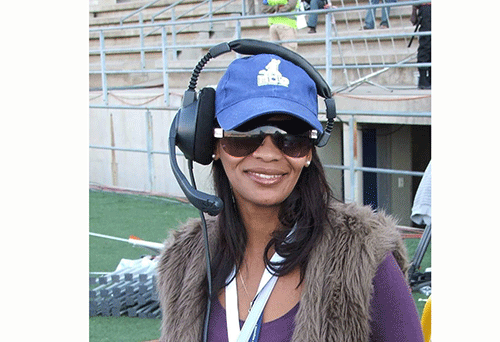Name:Katrina //Gowases
Date of birth: 26 August 1979
Place of birth:Windhoek
Occupation: Sport Journalist
How long have you been a sport journalist?For over 20 years now.
You are one of Namibia’s few female sport journalists; what would you say is the most challenging thing about your job, especially being a female sport journalist?The most challenging thing is the fact that you are working on deadlines and newsmakers many a time don’t see the urgency to respond to your questions on time. Also in the past, it was a bit challenging to get interviewers from newsmakers who were older than you, as they had their trust issues with young journalists – but that has since changed.
Sports journalism has traditionally been a male-dominated space; how have things changed since you first joined this industry?The setup hasn’t really changed much. I found two female sport journalists – Nomvula Kondombolo and Natasha Diergaardt. Rose Hamukwaya Tobias joined shortly thereafter and then followed by Kaino Nghitongo – but as we now speak, all four of them left sport journalism to do other things. But there is now an influx of a new breed of female sport journalists like the likes of Limba Mupetami, Joviita Kandjumbwa and Nancy Halweendo. But still, having mentioned those young reporters coming through, one can count the number of female journalists on one hand and that’s not the true reflection of our population. Our male counterparts are not making it any easier. Female sports reporters face a lack of representation in the newsroom and a lack of respect from our male peers. There was a point I had to travel to Botswana to cover an event on a bus full of men, including our camera crew.
Looking at the evolvement of modern sports journalism, would you say it has now become more accommodative to female journalists? Partly – because as women, we constantly had to prove we are capable of doing what our male counterparts can do. Also, with the advent of social media things have improved a lot.
Looking at your impressive progression as a sport journalist, is there any female journalist who inspired you?There were no female sport journalists role models to look up to when I started, but I was privileged to have gone through the mentorships of incredible journalists like the sports writing doyen himself Carlos Kambaekua, the late Moses Kandjoze, Isack Hamata and many others. But there were female sport casters like South Africa’s Carol Tshabalala whom one could look up to.
Being a renowned female sport journalist yourself, what advice would you give to an aspiring female sport journalist?All I can say is ifyou have passion for something, go for it! Become knowledgeable on everything; don’t limit yourself. We are capable of doing things exceedingly. Earn your trust and respect. Don’t let anyone to look down on you. Also, a journalist is only as good as his or her last story. Let’s look out for one another’s crowns; let’s celebrate one another’s achievements and assist where possible.
You recently won the prestigious Commonwealth Point of Light Award; how do you feel about this achievement and how did you receive the news?I was speechless. All honour and glory to God, the giver of my life and talent. My first ever acknowledgement for my sacrifices in sports. I will do it over again because it is all out of love. I have worked and covered sports on a wide spectrum, dealing with grassroots development to mainstream national sports programmes. I have realised the importance of voluntarism and the difference it can make in society, especially amongst the less privileged and marginalised communities. The past years have seen me work with athletes living with disabilities and women in sport, and it was then when I realised the impact and contribution of my work as a journalist.
I am very passionate about the sports fraternity and especially about athletes living with disabilities.
Also, quickly shed some light on this award; what is the Commonwealth Point of Light Award and to whom is it awarded?The Commonwealth Points of Light Award recognises outstanding individual volunteers, people who are making a change in their communities. Her Majesty, the Queen, as head of the Commonwealth, is thanking individual volunteers across the 54 Commonwealth nations for the difference they are making in their communities and beyond through these awards. I was awarded for using my position as a journalist to promote the issue of representation, wanting all athletes to have access to the same platforms as able-bodied people. I’m also on the Board of the ‘Basketball Artists School’, a programme working to improve access to education and awareness of healthy lifestyles to over 60 children a year who live in less privileged communities
Looking back now, what is the one or two things you wish you had known before becoming a journalist?That I had to sacrifice my weekends, working late nights and waking up as early as 06h30 to cover morning events. You will make enemies along the way for being a whistle-blower – but otherwise, I love every moment of my work.
What’s the best thing about your job?Interacting with people from different backgrounds, travelling and cultural exchanges. I learn new things every day.
What is the importance of having female storytellers in sports? Media has the ability to challenge the norms, promoting a balanced coverage of men and women sports, and a fair portrayal of sportspeople – irrespective of gender. Women are needed to lead the change in the media’s portrayal of women in sport and athletes living with disabilities. Whilst progress has been made over the years in bringing attention to gender equality in sport, greater effort by all involved is clearly needed.


